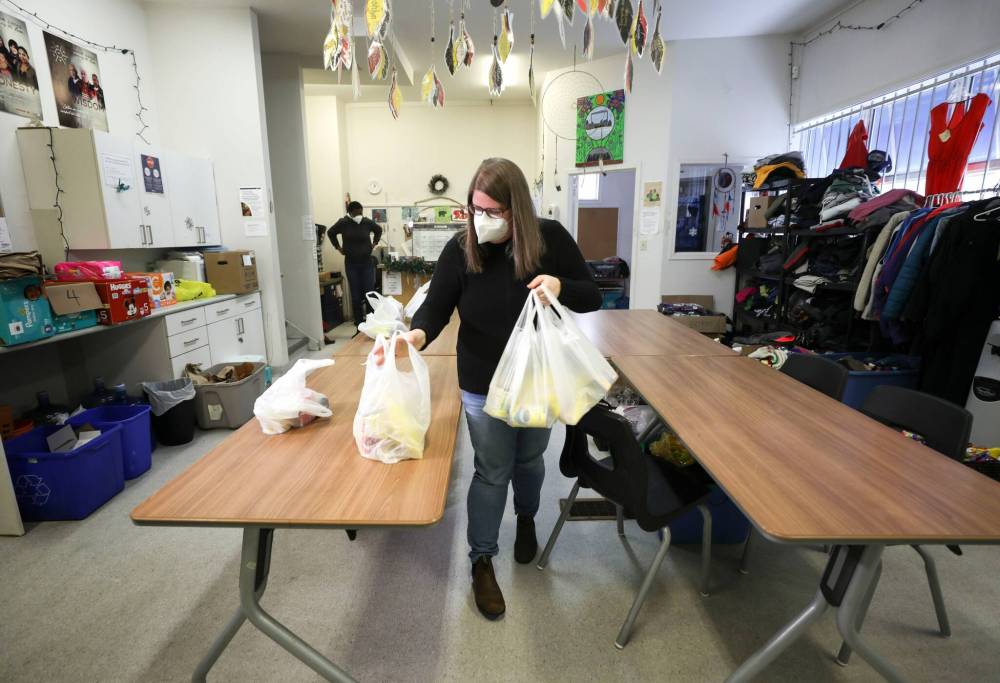Women’s centre resources under pandemic stress
Advertisement
Read this article for free:
or
Already have an account? Log in here »
To continue reading, please subscribe:
Monthly Digital Subscription
$0 for the first 4 weeks*
- Enjoy unlimited reading on winnipegfreepress.com
- Read the E-Edition, our digital replica newspaper
- Access News Break, our award-winning app
- Play interactive puzzles
*No charge for 4 weeks then price increases to the regular rate of $19.00 plus GST every four weeks. Offer available to new and qualified returning subscribers only. Cancel any time.
Monthly Digital Subscription
$4.75/week*
- Enjoy unlimited reading on winnipegfreepress.com
- Read the E-Edition, our digital replica newspaper
- Access News Break, our award-winning app
- Play interactive puzzles
*Billed as $19 plus GST every four weeks. Cancel any time.
To continue reading, please subscribe:
Add Free Press access to your Brandon Sun subscription for only an additional
$1 for the first 4 weeks*
*Your next subscription payment will increase by $1.00 and you will be charged $16.99 plus GST for four weeks. After four weeks, your payment will increase to $23.99 plus GST every four weeks.
Read unlimited articles for free today:
or
Already have an account? Log in here »
Hey there, time traveller!
This article was published 24/01/2022 (1416 days ago), so information in it may no longer be current.
As the cost of living in Manitoba rises and the COVID-19 pandemic continues on, so do the needs of women’s centres providing resources to vulnerable people.
At the North Point Douglas Women’s Centre, the cupboards usually filled to feed people in need in the neighbourhood are literally bare, Christie Paul, who works as a team growth facilitator at the Austin Street North centre, told the Free Press.
“When food arrives here, word travels really fast in the community, so what we have goes very quickly, and truly, right now, our cupboards are absolutely empty. We have nothing,” she said Friday.

“Literally nothing — there’s few sauces or something kicking around — that’s it. As soon as resources come in, they flow out to the community, so it’s really needed right now.”
It’s a place many non-profit organizations find themselves in after the holidays, Paul said, noting January and February are often the hardest times of the year to secure food donations.
“We often say, actually, to people when they’re donating to us in December, if they want to wait and come back in January, that’s when people are hungry,” she said.
There are different ways to give – people can just drop off food, and there are Amazon and GoodLocal wish lists available on its website for people to buy goods online.
There’s always a need for food, but that need has been exacerbated as the pandemic has continued, advocates say. The cost of living is getting higher, and bigger charities such as Harvest Manitoba have reduced some services due to COVID-19, meaning smaller organizations, such as the women’s centre see more hungry people.
“We’re connected to a number of organizations that provide emergency food, clothing, and in some cases, shelter, and there’s always a food shortage. Always,” Paul said.
“In fact, that’s where so many of our discussions come, just how we can work together to share resources and make sure that people have their basic needs met.”
The centre had to go back to solely door service in January, due to spiking Omicron variant cases, as opposed to before, when people could come and sit, get warm and have coffee.
It is now assisting 30 to 40 people per day, as opposed to pre-Omicron, at anywhere from 60 to 100. The people they do see are struggling more as the pandemic continues, Paul said.
“These people in our community are struggling more, mentally, emotionally. So when we can’t provide things that people need, the frustration level is much higher than it used to be,” she said. “The sense of desperation is definitely much, much higher.”
At the North End Women’s Centre on Selkirk Avenue, warm winter wear is currently a critical need, director of organizational development Kristi Beaune said.
“Temperatures are still so severe that people go through winter wear, and the population of folks that we see at the door, they don’t have access necessarily to wash and dry clothing, so they need new stuff, dry stuff.”
Mittens, tuques, scarves, even blankets and thick socks are needed, mostly in adult sizes. On an ongoing basis, the centre always needs menstrual products, diapers and baby formula, especially costly item for parents as things get more expensive due to the pandemic.
“There’s not been a lot of increases in people’s income or EIA, but the cost of goods we all know are going up astronomically,” Beaune said. “It just seems like, especially over the last six months, we get people coming here for those essential needs.
The North End Women’s Centre never closed through the pandemic, excepting two days where the drop-in centre was closed after COVID-19 cases in staff resulted in shortages.
In the early stage of the pandemic, it got out in the community it serves that it was providing people travelling to the neighbourhood from other areas access to critical supplies. That hasn’t dwindled, Beaune said.
“If there’s a positive to COVID, it’s that people know about us. Maybe they came here for essential needs in the early days of COVID, but now are in a different place, and they’re looking for support for counseling, or they’re looking for housing supports, and we offer all of those things.”
malak.abas@freepress.mb.ca

Our newsroom depends on a growing audience of readers to power our journalism. If you are not a paid reader, please consider becoming a subscriber.
Our newsroom depends on its audience of readers to power our journalism. Thank you for your support.







